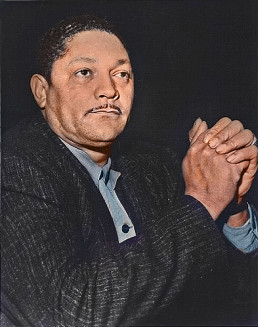
LOS ANGELES (CBSLA.com) — At an early age, Jamelle Dolphin knew that his last name carried weight.
“Once people found out my last name was Dolphin, they always asked me if I identified or knew John Dolphin, ” he said.
This is a common inquiry that has followed Dolphin well into adulthood.
Over 60 years ago, his grandfather was mere a music advertiser making a living as a pre-owned vehicle sales rep. After moving to Los Angeles from Detroit, Dolphin quickly set up himself and opened the first 24-hour record store in Los Angeles, off Central Avenue, in 1948.
According to Jamelle Dolphin, “He was only a financial specialist who had a deep love for music.”
For everyone living in L.A., John Dolphin was notorious, but his fame extended beyond the city’s limits. He was the originator of Dolphin’s of Hollywood, a name that came out of protest during a time or racial isolation in the early days of recording and rock n’ roll.
Yet today, many years after the fact, Jamelle Dolphin is able to keep his grandfather’s legacy alive, despite the six Dolphin’s of Hollywood locations that closed their doors in the 1990s. Jamelle managed to bring his grandfather’s tale to life in the form of a musical, melodic storytelling debuting in, what other place, Hollywood.
“Recorded in Hollywood: The John Dolphin Story” gives credit, which is long overdue, to the man Jamelle says had a great impact on Sam Cooke, The Penguins, and The Hollywood Flames.
He passed on a photograph of his grandfather grinning in the shop close by Billie Holiday, who was one of the many notable musicians and artists attracted to the celebrated business, which opened its entryways in with a name seemingly prophesied its future.
“They wouldn’t permit a person of color to work in that business in Hollywood at the time, so my grandfather opened his shop on Central and called it Dolphin’s of Hollywood,” Jamelle clarified. “He said he wanted to bring Hollywood to Central.”
The decision on Brown v. Leading body of Education wouldn’t come for a very long time. Yet, during that time, Dolphin was able to establish his first record name, Recorded In Hollywood, in 1950.
A public broadcast came not long after. “Harlem Hit Parade,” taking its name from the Billboard diagram, broadcast on KRKD, and Dolphin took advantage of it as an outlet to advance the craft of cutting-edge craftsmen.
DJs like Huggy Boy, Hunter Hancock, and Charles Trammel spun records as the night passed, drawing hordes of youthful black, white, and Latino Americans, and some undesirable attention from the LAPD.
“It transformed into a beautiful interracial scene,” Jamelle said. “At the same time, it caused a great deal of debate. Before long, the LAPD began to close down the scene, the record store.” Fortunately, Dolphin proved victorious in the long run, driving a walk-in dissent of a police bar of his business in 1954.
He continued to have a positive impact on the community, and Dolphin’s of Hollywood turned into a nearby chain, a beacon that included and interested artists who didn’t receive mainstream Hollywood attention.
According to Jamelle, “Everyone needed to be a vocalist in those days, and John Dolphin was the source for them.”
Unfortunately, that impact led to his demise, when a misinformed artist, Percy Ivy, shot and executed Dolphin in 1958.
Previously, the two of them recorded music together, but their songs were rarely delivered. Ivy came outfitted to Dolphin’s office in Hollywood after a contradiction over cash and responsibility for accounts. He was lethally shot in the chest and passed on at his work area.
Dolphin’s significant other, who then became a single parent to five youngsters — one of them Jamelle’s father — gained control over her husband’s domain. Dolphin’s of Hollywood had a good run, but the businesses had to close their doors at the primary South LA location 1989.
“I wish it was still here. We could’ve made a big difference for the name,” Jamelle said.
Even though the stores are no longer in existence, Jamelle is honoring his grandfather’s name and the store’s legacy.
NAACP grant victor Denise Dowse is coordinating the play at the Lillian Theater, with previous “Lease” entertainer Stu James driving the cast.
Jamelle, credited with building up the story, has worked closely with Matt Donnelly, an essayist known for his work on “Siblings and Sisters” and “Mixology.”
Andy Cooper wrote more than twelve unique tunes, to which the melodies are set. Music chief, Stephan Terry, amps up the sentimentality with hits like Sam Cooke’s “You Send Me,” The Penguins’ “Earth Angel,” and “Wheel of Fortune” by the Hollywood Flames, all tunes Jamelle says initially broke on the Dolphin’s of Hollywood public broadcast.
“Before Motown became popular, there was the John Dolphin story,” according to a review of Dolphin’s story. Jamelle couldn’t agree more with that assessment.
“I think my grandfather did something amazing, and his story deserves to live on.”
“Dolphin’s of Hollywood” opens Saturday with exhibitions Fridays and Saturdays at 8 p.m. What’s more, Sundays at 3 p.m. through May 17.
